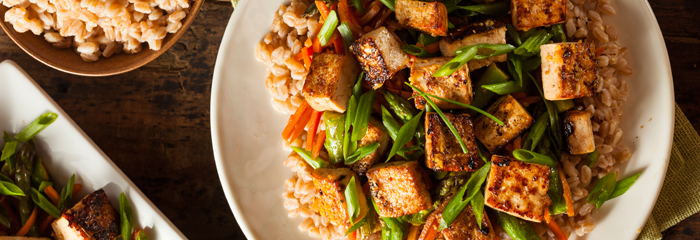Vegan Protein

There is much research to show that eating a largely vegan diet can help to reduce the risk of many diseases as well as being better for the planet. However, it is also possible to eat a vegan diet that does not provide everything that a healthy diet should. Eating animal products is an easy way to ensure that all essential amino acids (the building blocks of protein) are provided without there needing to be much thought. However, vegans need to be more savvy about getting the full range of amino acids and sufficient protein.
Here are some tips to ensure your vegan meals are delicious, nutritious and satisfying:
- Tahini and nut and seed butters – can be stirred into cooked grains or porridge to increase protein content. They can also be made into sauces or dips by adding lemon juice, tamari and water. Use on stir fries, steamed vegetables, salads or raw vegetable crudités.
- Beans, peas & lentils – these inexpensive and versatile foods can be used to add protein and texture to soups, stews, casserole, dips and salads. Combining pulses with grains or nuts and seeds provides the full range of essential amino acids needed for health.
- Sprouted beans and seeds – whole dry beans, lentils and seeds can be soaked overnight and then left in a sieve or colander to sprout for a few days. The sprouts can then be used in salads or sprinkled onto cooked foods at the end of cooking.
- Tempeh – made from fermented soy beans meaning is is more digestible than some soy products and a better food than the processed soya that is used in many processed foods.
- Tofu – firm or silken tofu can both be used as good sources of plant protein. Marinated or smoked tofu has a good savoury flavour while silken tofu adds creaminess to desserts and sauces.
- Green vegetables – all vegetables contain carbohydrates but green vegetables contain good quality protein that can enhance the health benefits of any meal.
- Nuts & seeds – as well as containing protein and minerals these also contain beneficial fats needed for many aspects of body function.
- Quinoa – higher in protein than most grains, quinoa contains all the essential amino acids.
For more information see blogs on The rise in veganism and egg replacements, Vegan dairy alternatives and Vegan oils.
Here is a recipe for delicious vegan burgers:
Veggie Burgers
The burger mix can be made in advance and stored, covered in the fridge. This helps it to firm up.
2 cups of oat flakes
400g firm tofu, mashed
1 tbsp coconut oil
2 cloves of garlic, peeled and finely chopped
1 tsp smoked paprika
Pinch of cayenne pepper
2 carrots, grated
1 beetroot, grated
1 tsp thyme
4 tbsp tahini or almond butter
2 tbsp tamari soy sauce
Salt and pepper
Olive oil for brushing
- Combine the oat flakes and tofu together in a bowl and leave to soak for 20-30 minutes.
- Heat the oil in a heavy bottomed frying pan and add the garlic, paprika and cayenne. Cook for a minute.
- Stir in the carrots, beetroot and thyme and cook for a minute or two.
- Blend together the tofu and oat flakes in a food processor briefly. Add the tahini or almond butter and tamari and blend briefly again.
- Add the carrot and beetroot mixture and stir well or blend briefly. Season with salt and pepper.
- At this stage the mixture can be transfered to a bowl, covered and refridgerated. This helps it to thicken up. However this is not essential.
- Divide the mixture into evenly sized burgers and brush each one with olive oil on both sides.
- Place the burgers onto a lined baking tray. Bake in the oven on gas mark 4/180C for 15 minutes, turn each one over then cook for a further 15 minutes.
- Serve with salad or in a bun or pitta bread.